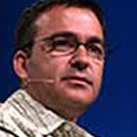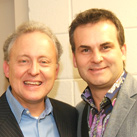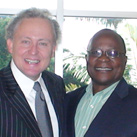Winning the Christian Race: Philippians Series #16

When we read the letters of the Apostle Paul it becomes very apparent to us that he was familiar with athletic activities. He uses all kinds of athletic terminology in his letters. It causes us to think that probably, as Paul was touring on his preaching ministry, sharing the Gospel of Jesus to the various major cities of the ancient world, that along the way he would go by the stadiums and would attend the games.
 While watching those games he would draw many analogies and lessons about life. He came to see that the Christian life is very much like a race. In the New Testament era, they had the Olympic Games. In these Olympic Games, there were a lot of track and field events. One of the main ones was running. Paul uses the figure of speech of running to describe what the Christian life is all about. He describes the Christian life as like a race. We are in a race, in what God wants us to be, growing into that kind of person God would have us to be.
While watching those games he would draw many analogies and lessons about life. He came to see that the Christian life is very much like a race. In the New Testament era, they had the Olympic Games. In these Olympic Games, there were a lot of track and field events. One of the main ones was running. Paul uses the figure of speech of running to describe what the Christian life is all about. He describes the Christian life as like a race. We are in a race, in what God wants us to be, growing into that kind of person God would have us to be.
In that context, it helps us understand what seems to be a contradiction between verses 12 and 15. In verse 12, he says, “Not as though I had already attained, either were already perfect.” In other words, in verse 12 he says, “I am not perfect.”
In verse 15, he says, “Let us, therefore, as many as be perfect.” In verse 12, he says, “I’m not perfect.” Then, in verse 15 he says, “As many of us as be perfect.” What we must keep in mind here is that Paul is not talking about sinless perfection. The contextual idea is not us being perfect in the terms of being sinless; but rather he is writing about maturity. He is talking about our progress in the Christian life.
Paul says in verse 12, “I’m not perfect. I’m not where I want to be.” In verse 15, he says, “I am perfect.” He’s talking about relative perfection not ultimate perfection.
For example, a child growing up and going through the various stages of development. You look at this little girl and you say, “She is a perfect 12-year-old.” That doesn’t mean she is a grown woman. That doesn’t mean she has grown as much as she is going to grow. But what it means is that at that stage in her life, at that stage in her development, she is a perfect 12-year-old girl.
Let’s go back to the running analogy. Think about a man who is running the mile. He clocks off the first lap of the four laps. They time it and they say that this is a perfect first lap. It doesn’t mean that the race is over. It doesn’t mean that he might not improve and make further progress. It means that at that stage in the race he is exactly where he needs to be. We need to understand that this is what Paul is saying here. He is saying that we are in a race. We are in the race of the Christian life, a race toward maturity.
Let’s get ready to start the race. The race begins today. We are all at the starting line. The gun fires and the race begins. Paul wants us to follow the progress of the Christian race.
I. Finding Christ In The Race
 In Philippians 3:12, Paul states, “I haven’t attained. I’m not perfect. I’m not there yet, “But I follow after, if that I may apprehend that for which also, I am apprehended of Christ Jesus.” He’s talking here about the start of the race.
In Philippians 3:12, Paul states, “I haven’t attained. I’m not perfect. I’m not there yet, “But I follow after, if that I may apprehend that for which also, I am apprehended of Christ Jesus.” He’s talking here about the start of the race.
We Have Apprehended
We need to notice first that he says, “I have been apprehended.” The word “apprehended” means to lay hold of. I have been laid hold of. He’s talking about his experience of salvation. He is talking about when the race began in his life.
This may sound trite but it’s absolutely essential. You cannot run the race until you start the race. There has to be that time when we get down in the cinder block to get ready until the gun fires and we start the race.
There was a day when the race started in Paul’s life. Paul was on the Damascus Road and the Lord Jesus Christ apprehended him. In other words, Jesus Christ laid hold of him and his life.
The same thing is true for every believer who reads this book. If you have truly been saved and you know Christ as your Savior; there was a time in your life when Jesus laid hold of your life. It might have been in a church service. You might have been watching television and Jesus laid hold of you. You could have even been by your bedside and you received Christ as your Savior. Jesus apprehended you. Jesus laid hold of your life.
In I Timothy 6, verse 12, Paul says, “Lay hold on eternal life.” Jesus lays hold of us in grace. We lay hold of Him by faith.
Paul says, “I am apprehended.” The gun has fired. The Christian life has begun.
We Have Not Attained
Notice that he not only says, “I am apprehended,” but then secondly, he says in this opening statement, “I am apprehensive.” He says that I haven’t arrived. I haven’t attained yet. I have not apprehended. He is saying, “I have not become everything Jesus has saved me to become.”
There was a first grader who went to school the first week of school and he came home on Friday, and he announced to his mom, “I’m not going back to school next week.” She asked, “Why aren’t you going back?” He said, “Because they can’t teach me anymore.”
Sometimes Christians think that way. They believe they have arrived in the Christian life. We don’t ever arrive in the Christian life. We don’t know everything there is to know about the Bible. We’ve not grown the way God wants us to grow in the Christian life. So, we make up our mind that we have not arrived yet, that we have not apprehended. We are not everything that God wants us to be.
Tennyson was one of the greatest poets of all time. You may know that Tennyson’s poem “In Memoriam,” is one of the greatest poems ever written. Are you aware that Tennyson spent 70 years writing that poem and that there were certain passages of that poem he rewrote over 100 times? He had never arrived. He had never reached perfection.
As we begin the race, we need to keep in mind that there is a race ahead of us.
II. Following Christ In The Race
 Maybe you are an athlete. Maybe you are a runner. I guess I am classified as a jogger.
Maybe you are an athlete. Maybe you are a runner. I guess I am classified as a jogger.
If you notice, as he gives this picture of running the race, how beautifully the picture is drawn as it applies to making progress in the Christian life. The gun has fired. The race has begun. We are now running the race.
We Focus On The Present
There are several crucial elements of running the race that are given to us in these verses. In verse 13, we read, “I count not myself to have apprehended; but this one thing I do.” Please note the concentration on the present. “This one thing I do.”
Have you ever noticed in the Bible how many times it mentions “one thing?” Let me give you some verses that talk about “one thing.” The blind man said in John 9:25, when Jesus had healed him of his blindness, “Whether he is a sinner or not, I know not; one thing I know, that whereas I was blind, now I see.”
In Psalm 27:4, we read, “One thing have I desired of the Lord, that will I seek after, that I may dwell in the house of the Lord all the days of my life, to behold the beauty of the Lord, and to inquire in his temple.”
Do you remember when the rich young ruler came to Jesus? In Mark 10:21, it says, “Then Jesus, beholding him, loved him, and said unto him, One thing thou lack.”
There is also the experience of Martha. Jesus said to her in Luke 10:42, “But one thing is needful, and Mary hath chosen that good part, which shall not be taken away from her.”
Paul picks up that terminology, “one thing.” “This one thing I do.” Paul is saying here, “I am putting total concentration on the race, a concentration on the present.”
Did you know that there is tremendous power in concentration? Think about an electric drill. One of the things that make the electric drill so powerful is the tremendous concentration of power at one point.
Think about the concentration of a great concert pianist. Or think about a field goal specialist on a football team who concentrates his effort, who works tirelessly on doing that one thing. There is power in concentration.
Paul is saying that we need to concentrate our total attention on the assignment of running the race for the Lord Jesus Christ. We are not a wandering generality but a definite specific!
There are too many Christians who instead of saying, “This one thing I do,” they would say, “These 40 things I dabble in.”
Psalm 86, verse 11, says, “Teach me thy way, O Lord; I will walk in thy truth; unite my heart to fear thy name.”
Are you focused as a Christian? Are you in a zone about the Christian life?
Why is it that Christians think they can grow and mature in the Christian life and not have total concentration? You just can’t read the Bible sporadically and attend church spasmodically and just pray occasionally and expect to be successful in the Christian life. We must concentrate on the present and be able to say, “This one thing I do.”
If you want to be a victorious Christian, if you want to be a Christian who excels, then be like the runner. “This one thing I do.” Get your mind on what you are doing.
We Forgot The Past
 Not only is there concentration on the present but the second phrase says, “Forgetting those things which are behind.” Paul is teaching, obliteration of the past He’s not saying we don’t have any memory of the past. They tell me you never ever really forget anything. Some people don’t have a hard time forgetting. The older you get the more you tend to forget.
Not only is there concentration on the present but the second phrase says, “Forgetting those things which are behind.” Paul is teaching, obliteration of the past He’s not saying we don’t have any memory of the past. They tell me you never ever really forget anything. Some people don’t have a hard time forgetting. The older you get the more you tend to forget.
There was a guy who was aspiring to be an actor. He finally won a part in the play. His part in the play was just two simple words. Someone would ask the question, “Did you see the man killed?” And he was to answer, “I did.” That’s all he had to say.
He worked on those two words for weeks. He memorized it and memorized it. All he had to say was, “I did.” His big night arrived, and the other actor said, “Did you see the man killed?” He said, “Did I?”
Did you hear about the man who went to the psychiatrist? He said, “Doc, I’ve got real problems.” He asked, “What’s your problem?” He said, “I just can’t remember anything. My memory is just shot. I’m just totally forgetful.” The doctor said, “You’ve got a real problem. How long have you been that way?” He said, “How long have I been what way?”
Paul is not saying that you don’t remember. God says in the book of Jeremiah, and again it is repeated in the book of Hebrews, that God forgets our sins. He says, “Your iniquities, I will remember no more.” This verse doesn’t mean that God has some kind of divine amnesia and He doesn’t remember it.
What Paul means when he says, “Forgetting those things which are behind,” “Do not allow the past to influence you or to affect you.” In other words, don’t let the past keep you from winning the race. He’s saying to not run looking over your shoulder. Runners who have competed in races know that one of the basic rules of winning the race is you do not run looking over your shoulder.
There are some Christians who never make progress in the Christian life because they are dwelling on the past. There are some Believers who are not successful in the Christian life because they are dwelling on the past.
Someone said that memory is a nursery where children, grown old, play with broken toys. There are some Believers that all they do is dwell in the past. Someone said that the load of tomorrow added to that of yesterday and carried today, makes the strongest falter.
There has to be an obliteration of the past. “Forgetting those things that are behind.”
Let me tell you some things you should forget. You should forget past sins. If you have confessed those sins to God, God says that He will forgive you of your sins. Accept God’s forgiveness and let go of your past sins. They are buried in the depths of the sea. Forget them.
You should forget your past failures. There is no need to cry over spilled milk. There are some people that never make any progress because they think about all of the ways they have failed. All of us have failed. The great inventor, Thomas Edison, went through literally hundreds of experiments that failed before he invented the electric light bulb.
Build on your mistakes but don’t dwell on your mistakes.
You should forget about past successes. It’s easy to just dwell on the past. A church can say, “We used to do this and that. The way it used to be.” The past is gone forever. Thank God for the successes of the past. Thank God for the blessings of the past, but we are living in the present. Let go of your past successes.
Let go of your past grievances. “They did me wrong and I was counting on them.” Many Christians have those past grievances just eat their hearts out. It has wrecked their Christian life. It has spoiled their Christian testimony. They have now become a bitter, grumpy, complaining believer because they are dwelling on your past grievances.
Joseph had an opportunity to be like that with his own brothers. Yet, Joseph said, “You meant all of that for evil, but God meant it for good.” God is in charge. He knows what He is doing with your life.
We Forge For The Potential
Here’s the runner. He’s running. “This one thing I do.” Concentration on the present. “Forgetting those things that are behind.” He’s not looking over his shoulder. Obliteration of the past. Here’s the third element. He says in the last part of verse 13, “Reaching forth unto those things which are before, I press.” There is now a total concentration, a total mindset toward the future. “I am pressing toward the mark.”
What a picture this is of a runner. Do you see him? He’s on the track. He is reaching forth unto those things that are before. In other words, every muscle in his body is stretching and straining. His heart is pumping blood furiously. His lungs are bringing in great chunks of oxygen. His feet are pounding the surface of the track. He is totally stretched out, reaching toward those things that are before.
What Paul is teaching is how we should live the Christian life. We should live the Christian life looking toward the future. We should live the Christian life thinking about what we can do for Jesus Christ tomorrow. We should live the Christian life thinking about what God is going to do in mine and your life today. It’s no time to give up the race. It’s time to keep on stretching all the way in the race.
III. Finishing For Christ In The Race
 The first picture is starting the race. The second picture is running the race. The third picture is winning the race.
The first picture is starting the race. The second picture is running the race. The third picture is winning the race.
Paul writes in Philippians 3:14, “I press toward the mark for the prize.” He’s talking now about winning the race, the mark to be reached. He’s talking about the finish line. He’s now in the home stretch. He sees the finish line. He sees the tape.
The Mark To Reach
In Hebrews 12:2, we read, “Looking unto Jesus, the author,” which means Jesus starts us in the race. Then it says, “The finisher of our faith.” That says that Jesus is at the starting line to get you going, and Jesus is at the finish line to welcome you when you get there.
The goal of the race is to be like Jesus. The purpose of the Christian life is to be like our Lord Jesus Christ.
“Reaching forth unto those things which are before, I press toward the mark.” He’s running now toward the tape. I wonder if you are running for the tape. Are you ready to hit the tape?
The Medal To Reward
After we notice the mark to reach, we read about the medal to reward. It says, “I press toward the mark for the prize of the high calling of God in Christ Jesus.”
When the runner turns the last curve and heads into that final stretch and he hits the tape, he or she knows it is time for the reward. As soon as he hits the tape, there is a thunderous applause of the people in the stands. Then, in Paul’s time frame, an official would come to the runner and say, “You’ve been called up.” The successful, victorious athlete would go up to the Emperor’s box. He would step into that box and the Emperor would congratulate the successful runner. He would award him the prize; the emblems of his victory.
The runner would get 500 drachma. He would be awarded free front row seats at all of the special events. His family was relieved of their income taxes. Everything imaginable was awarded because he had successfully run the race.
In I Corinthians 9:24, we read, “Know ye not that they who run in a race run all, but one receives the prize? So run, that ye may obtain.”
In those days, one person won the prize. But in these days as a Christian, everybody can win the prize. One of these days you are going to hit the tape, and the Lord will say, there is a crown laid up for you. God’s going to give you a medal.
Do you know what I think the metal will be? I think the medal will have on it “WD, Well done.” Wouldn’t that be amazing to receive from Jesus, “Well done. You won the race.”
In II Timothy, the last book of which we have any record that Paul wrote, stated, “I have fought a good fight, I have finished my course” (2 Timothy 4:7). Paul was saying, “I have run the race and I have kept the faith.”
Then, in verse 8 we read, “Henceforth there is laid up for me a crown of righteousness, which the Lord, the righteous judge, shall give me at that day; and not to me only, but unto all them also that love his appearing.”
There came a day, that the Roman guards of the Mamertinum Prison, took Paul across the highway to the guillotine. They laid his head on the chopping block. The blade came down severing his head from his body and his head rolled into the dust. Someone said, “Poor old Paul. He just bit the dust.” Oh, no! He just hit the tape and Jesus said, “Well done Paul. You’ve run a good race. Here’s your prize.”
You may die on an obscure mission field somewhere unknown, unmourned and somebody will say, “That poor old missionary bit the dust.” No. He hit the tape.
At the bottom of a great mountain in Switzerland there is a little country church. In that church there is a grave of a young man who died ascending that mountain. On his tombstone it gives his name, the dates and then these words, “He died climbing.” What an epitaph!
Think about it. “Lord lift me up and let me stand, my faith on heaven’s table land. A higher plane than I have found. Lord, plant my feet on higher ground.”
Back To Blog




